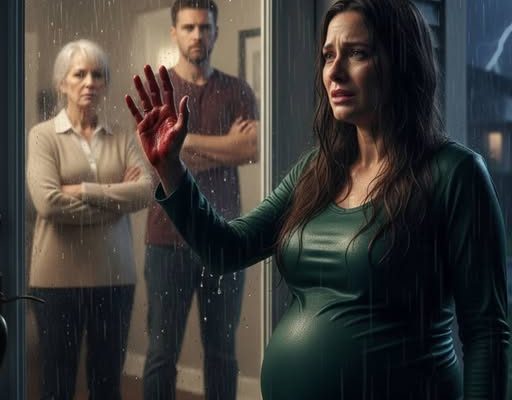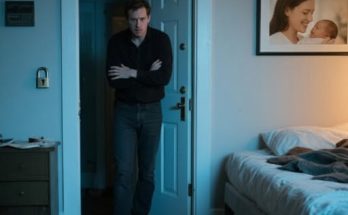Lightning splitthe sky above our Ohio suburb, turning the world white for a heartbeat. In that flash, you could see everything: the manicured lawn, the American flag snapping on the porch, and me—barefoot, six months pregnant, pounding on my own front door as rain hammered down like judgment. Each drop was a needle, cold and sharp, driving the truth deeper: I was not welcome here. Not anymore.
Inside, through the frosted glass, my husband and his mother stood in the yellow glow of the living room. Their faces were shadows, unmoving, watching me with the kind of stillness that only comes from certainty. I screamed until my throat was raw. “Please! I’m pregnant! Your baby is inside me!” My words blurred into the storm, swallowed by thunder and the endless Midwestern rain. Thomas, the man I’d built my world around, turned away first. Diane, his mother, lingered—her gaze as cold as the rain soaking through my sweater—before she, too, disappeared. The living room light snapped off. I was left in darkness, just another secret in a quiet American neighborhood.
That was when the pain started. A twisting, brutal cramp deep inside, more terrifying than the cold. I pressed my palm to my belly, desperate to feel my daughter move. She kicked, strong and alive, but I could feel something else—something tearing inside me, something breaking that would never heal. The woman who had loved Thomas, who had believed in home and family and happy endings, died on that porch. The rain washed her away.
But something else was born in her place.
I don’t remember how long I stood there, pounding on the door, blood from my split knuckles mixing with the rain. Minutes, hours—it didn’t matter. The street was empty, the only sound the storm and my own sobbing. I tried the garage, the windows, every entrance. All locked. They’d planned this. Every exit sealed, every hope choked out.
I collapsed on the steps, shivering, my teeth chattering so hard I bit my tongue. The pain in my belly sharpened. I felt the warmth of blood trickling down my thigh. “No,” I whispered. “Please, no.” My hands left red smears on the door as I pounded again. “Thomas! Diane! Something’s wrong. The baby—please.” Only silence answered me.
That’s when I saw the headlights. For a second, I thought I was hallucinating—a sleek black sedan cutting through the rain, pulling into our driveway. The engine idled, the door swung open, and a man stepped out. He was tall, lean, and dangerous, his dark hair plastered to his face by the storm. Even in the gloom, I recognized him: Alexe Volkov, the only real family I’d ever known.
He crossed the yard in three strides, his expensive suit ruined by the rain. “Elena.” My name was a growl, raw and furious. He knelt beside me, his hands surprisingly gentle as he wrapped his jacket around my shoulders. “Who did this to you?” His voice was soft as velvet, sharp as broken glass.
My lips trembled. “Thomas. Diane. They locked me out. I’m bleeding. The baby—” The rest dissolved into sobs.
Alexe’s eyes went flat and cold, the way I’d seen only once before, years ago in a group home when someone tried to hurt me. “We get you to a hospital. Then we make them pay.”
He lifted me effortlessly, carrying me to his car. The heat inside was a shock, the leather seats sticking to my soaked skin. He drove fast, one hand gripping the wheel, the other reaching back to squeeze my hand whenever another cramp hit. I drifted in and out, the world reduced to the sound of the rain, the thunder, and Alexe’s voice—sometimes in English, sometimes Russian—promising me I would not die. Promising someone would answer for this.
At the hospital, doctors and nurses swarmed me. I heard words like “hypothermia,” “stress contractions,” “premature labor.” I heard Alexe’s voice, low and threatening, refusing to leave my side. “I’m her family. I’m all she has.” My daughter’s heartbeat thundered on the monitor—strong, stubborn, alive.
When the danger finally passed, when the doctor told me my baby was safe, I broke down completely. Alexe sat beside my bed all night, silent, watchful, a dark guardian angel. In the harsh fluorescent light, I told him everything—about Thomas, about Diane, about the lies and the cruelty and the night they decided I was disposable.
He listened, face carved from stone. “You wanted a normal life,” he said when I finished. “Is this what normal gets you in America? Locked out in the rain by the man who promised to love you?”
I shook my head, tears burning my eyes. “I was wrong.”

“Yes,” he said. “You were.” He leaned closer, his voice dropping to a whisper. “Do you want my help, Elena? Not just a place to stay. Not just money. Do you want me to make them pay for what they did?”
The old Elena—the one who still believed in forgiveness, in second chances—died on that porch. The woman who survived wanted justice. Wanted revenge.
“Yes,” I said. “I want them destroyed.”
Alexe smiled, slow and dangerous. “Then sleep, little sister. Rest. Tomorrow, we go to war.”
This is the story of how I lost everything in the heart of America—and how I made damn sure they lost more.
Sunrise in Ohio is supposed to bring hope, but that morning, the hospital room was thick with dread. The blinds cut pale stripes across the floor, casting Alexe’s silhouette in stark relief against beige walls. I lay in the stiff hospital bed, my body bruised, my mind raw, clutching the tiny hospital bracelet that marked me as “Elena Volkov, Female, 27, Pregnant.” My daughter’s heartbeat was a steady thrum on the monitor—a promise, a warning, a reason to fight.
Alexe hadn’t slept. He sat by the window, phone in hand, voice low and lethal as he spoke in Russian, then English, then Russian again. I caught fragments: “Lawyer. Private investigator. Cash. No, I don’t care about the price.” He looked at me between calls, his eyes softening for only a moment before sharpening again, calculating, ruthless.
My phone buzzed on the tray beside me. A text from Thomas:
Don’t come back. It’s over. You brought this on yourself.
No apology. No concern for our child. Just finality, cold as the rain outside.
Alexe saw my face and took the phone, reading the message with a sneer. “He’s weak. He thinks he’s safe because he has the house, the money, the American dream. But he forgot something.” He leaned in, voice low. “He forgot you have me.”
I closed my eyes, remembering how I’d met Thomas—at a Fourth of July barbecue, fireworks exploding over the Ohio River, laughter and cheap beer. He’d seemed perfect: steady job, sweet smile, a family that looked like something out of a magazine. I’d wanted normalcy so badly I ignored the warning signs. Diane’s controlling questions, Thomas’s need to be right, the way he flinched if I disagreed in public. I’d traded chaos for comfort and ended up in a different kind of prison.
The nurse came in, gentle, efficient, checking the monitor and my pulse. “You’re lucky,” she said softly. “Whatever happened last night, you and the baby are fighters.” She glanced at Alexe, eyes lingering on the scars peeking from his collar. “Your brother?”
“Something like that,” I said, voice hoarse.
She smiled, but her eyes were wary. “You need rest. And you need to think about your next steps. The social worker will come by soon.”
After she left, Alexe turned to me, all business. “First, you recover. I’ll handle the rest. I want every detail—bank accounts, passwords, anything Thomas and Diane could use against you.” He handed me a legal pad, pen poised. “Write everything. Leave nothing out.”
I started, hands shaking, listing every secret I’d buried in the name of love. The savings I’d transferred to Thomas’s account. The car in his name. The health insurance Diane insisted on controlling. Every thread they’d woven into a net to catch me, hold me, break me.
Alexe listened, nodding, making calls, sending emails. He moved with the precision of a surgeon and the fury of a brother who’d seen too much suffering. “We’ll start with the house,” he said. “He can lock you out, but he can’t erase your name from the deed without a fight. Ohio law is on your side. And if the law isn’t enough, I have other ways.”
I flinched, remembering stories Alexe had told me years ago—about men who disappeared, fortunes lost overnight, reputations ruined by whispers and rumors. He’d always protected me, sometimes too fiercely. I’d run from him, seeking safety in Thomas’s arms. Now, I realized, there was no safety—only strategy.
The social worker arrived, clipboard in hand, voice gentle but firm. “Elena, do you have somewhere safe to go when you’re discharged?” She glanced at Alexe, measuring him, then at me. “We can connect you with resources—shelter, legal aid, counseling.”
Alexe’s smile was icy. “She has all the resources she needs.”
I nodded, grateful and ashamed. “Thank you, but I’ll be alright.”
The social worker pressed a card into my hand anyway. “If you change your mind. No one should face this alone.”
After she left, Alexe stood, rolling his sleeves. “We start now. You need clothes, a safe place to stay. I have an apartment in downtown Columbus. Security, cameras, no one gets in without me knowing. You’ll be safe there.”
He helped me dress, his hands gentle but impatient. Every movement was a promise: I would never be left outside in the rain again. The drive into the city felt surreal—skyscrapers rising above the cornfields, sunlight glinting off glass and steel. The apartment was high above the street, modern, anonymous, a fortress in the heart of America.
Inside, Alexe handed me a phone, a credit card, a folder thick with documents. “New number. New account. Everything in your name. No one touches your money but you.”
I stared at the city below, feeling the old Elena fading, replaced by someone harder, someone who understood that survival was never gentle. “What now?” I whispered.
Alexe’s answer was simple, chilling. “Now, we make them regret ever thinking they could break you.”
He outlined the plan: legal action first, then public exposure. “Thomas is vulnerable. He has debts, secrets. Diane’s reputation is everything—she’s on the board of three charities, the PTA, she cares about how she looks more than anything. We’ll start small. Anonymous tips. Leaked emails. Let the cracks show.”
I listened, heart pounding, as Alexe spun a web of retribution. For every kindness I’d shown, every humiliation I’d endured, there would be a reckoning.
That night, I lay awake in the silent apartment, city lights flickering beyond the windows. My daughter kicked, strong, alive, a reminder that I was not just fighting for myself. I was fighting for her future, for the right to exist without fear.
I thought of Thomas, of Diane, of the life I’d tried so hard to build. I thought of the porch, the rain, the moment everything changed. And I knew: the war had begun.
Tomorrow, the world would see what happened when an American dream turned into an American nightmare. And I would make sure that everyone—Thomas, Diane, and anyone who ever doubted me—would remember my name.
Morning in Columbus was a different kind of quiet—no birds, no familiar creak of porch steps, just the hum of traffic far below and the distant siren song of a city that never really sleeps. I woke in Alexe’s apartment, sunlight slashing across the hardwood floors, my body stiff but determined. My daughter shifted inside me, a silent promise that I wasn’t done yet.
Alexe was already gone, but he’d left a note on the kitchen counter. Meeting with lawyer at 10. Be ready to fight. —A. There was coffee brewing, a new phone buzzing with messages from numbers I didn’t recognize. One was from the investigator Alexe had hired:
Found evidence of financial misconduct. Diane’s charity accounts don’t add up. Will send files soon.
I stared at the phone, heart pounding. The plan was in motion. Alexe had warned me: “Revenge is not a single blow. It’s a series of cuts, each one deeper than the last.” I was ready.
The lawyer arrived precisely at ten, sharp suit, sharper eyes. He introduced himself as Mr. Carter, specializing in “domestic disputes with high-value assets.” He didn’t flinch at my story. “We’ll file for emergency protection,” he said, flipping through documents. “You have a right to the house, to joint assets. The court will listen. Especially after what they did.”
He explained the strategy: freeze accounts, file for divorce, gather every scrap of evidence. “We hit them fast,” Carter said. “You’re not just fighting for yourself. You’re fighting for your child.”
Alexe returned as Carter left, his face grim. “Diane’s board is panicking. Anonymous emails, photos of her with politicians, money trails that don’t make sense. She’s calling Thomas every hour. They’re scared.”
I felt a flicker of satisfaction—but it wasn’t enough. “I want them to feel what I felt. Alone. Powerless.”
Alexe nodded. “They will.”
The next days blurred together—court filings, meetings, endless phone calls. The investigator sent files that painted Diane as a fraud, siphoning money from charities meant for sick children. Alexe leaked them to local reporters, careful to hide my name. The headlines exploded:
Local Philanthropist Under Investigation for Fraud.
Charity Scandal Rocks Suburban Board.
Thomas tried to call me—once, twice, a dozen times. I let every call go to voicemail. His messages grew desperate, then angry, then pleading. “Elena, please. We can fix this. Just come home.”
Home. The word tasted like ashes.
The court hearing came quickly. I sat in a cold, echoing room, Alexe beside me, Carter on my other side. Thomas looked lost, smaller than I remembered, eyes red-rimmed. Diane refused to meet my gaze, her lawyer whispering furiously in her ear.
Carter spoke first, his voice calm, relentless. “My client was locked out of her home while six months pregnant. She was denied shelter, warmth, and medical care. She nearly lost her child. This was not a misunderstanding. It was calculated cruelty.”
Thomas tried to interrupt, voice trembling. “She—she was unstable. Diane was scared for her safety—”
The judge cut him off. “Mr. Miller, your wife was hospitalized with hypothermia and stress-induced labor. This is not a matter for debate.”
I spoke only once, voice clear and steady. “I begged for help. I was left outside to bleed.”
The judge granted me emergency possession of the house, froze all joint accounts, and ordered Thomas and Diane to stay away. Their faces twisted—shock, rage, disbelief. For the first time, they looked powerless.
After the hearing, Alexe squeezed my hand. “First victory. Not the last.”
The news kept rolling in. Diane was suspended from every board. Her name became poison. Thomas’s job called—he was put on leave pending “personal issues.” The house was mine, but I didn’t want it. Every room echoed with betrayal.

Alexe suggested a new beginning. “Sell it. Take the money. Start fresh.”
I agreed. The sale was quick—buyers eager for a suburban dream, unaware of the nightmare behind the walls. I packed what mattered: my daughter’s ultrasound photos, a few books, nothing else.
On the last night before closing, I stood in the empty living room, rain tapping on the windows. I remembered everything—the laughter, the fights, the night on the porch. I felt the old pain, but it didn’t own me anymore.
Alexe waited outside, engine running. I locked the door one last time, keys heavy in my palm. I left them on the counter, a silent goodbye.
We drove into the city, headlights cutting through the dark. My daughter kicked, strong and insistent. I reached for Alexe’s hand, and for the first time in months, I felt safe.
Tomorrow, I would begin again. Not as a victim, not as a wife, but as someone who survived. Someone who fought back. Someone who learned that in America, the dream is yours only if you’re willing to take it back—piece by piece, breath by breath.
And I promised myself: my daughter would never know the cold of that porch. She would grow up knowing her mother was strong enough to face the storm—and win.
The city was a living thing—restless, bright, indifferent to my wounds. In Alexe’s apartment, high above the noise, I tried to build a new rhythm. Every morning, I watched the sunrise paint the skyline gold, my daughter’s kicks growing stronger. I learned the city’s sounds: horns, sirens, laughter drifting up from the street. I learned my own again, too—the way I breathed when I wasn’t afraid, the way I moved through rooms that belonged to me.
Alexe was always near, but never intrusive. He worked late into the night, phone pressed to his ear, orchestrating the final moves against Thomas and Diane. Sometimes I heard him speaking Russian, sometimes English, his tone clipped and cold. He was a shadow at my back, a shield I hadn’t known I needed.
I met with Carter and the investigator in a sleek downtown office, sunlight bouncing off glass tables. Carter handed me a stack of papers: the finalized divorce, the sale of the house, the transfer of assets. “You’re free,” he said, voice gentle. “Legally, financially. They have no hold on you.”
The investigator slid a folder across the table. “Diane’s reputation is finished. She’ll never sit on another board. Thomas’s job is gone. They’re scrambling to contain the fallout, but it’s too late. You’re safe.”
Safe. The word echoed in me, unfamiliar and precious.
But safety wasn’t the same as peace. I spent hours walking the city, exploring neighborhoods, watching families in parks and couples in coffee shops. Sometimes I felt envy—a sharp, bitter ache for the life I’d wanted. Sometimes I felt relief, a lightness in my chest that surprised me.
One afternoon, I found myself at the river, the same one where Thomas and I had met years before. The water was high, cold and fast, reflecting the autumn sky. I sat on a bench, hands resting on my belly, and let myself remember. The fireworks, the laughter, the hope. The lies, the fear, the night everything broke.
I cried—not for Thomas or Diane, but for the woman I’d been. Naive, desperate, willing to trade her own voice for a place at someone else’s table. I cried for the child I’d nearly lost, for the family I’d tried to build on broken ground.
When the tears dried, I felt something new—a resolve, quiet and fierce. I wasn’t the same woman who’d stood on that porch, begging for a home. I was someone who had survived, who had fought, who had won.
That evening, Alexe found me in the kitchen, humming to myself as I cooked dinner. He watched me for a long moment, then smiled—a rare, genuine smile that softened the lines of his face.
“You’re different,” he said softly.
“I have to be,” I replied. “For her. For me.”
He nodded, pouring two glasses of wine. “I have a job offer in New York. Security firm. Big clients, good money. If you want, you can come with me. Start over. No one will know your name.”
I thought about it—the anonymity, the chance to vanish, to rebuild from nothing. But I shook my head. “I want to stay. I want to make a life here. I don’t want to run anymore.”
Alexe studied me, then accepted my answer. “You have everything you need. If you ever change your mind, you know where to find me.”
The next weeks passed in quiet determination. I found a small apartment near the river, sunlit and safe. I registered for prenatal classes, met other mothers, began to build a circle of friends who knew nothing of Thomas or Diane or the war I’d survived. I found a job—part time, nothing glamorous, but mine. Every day, I grew stronger. Every day, my daughter grew closer to the world.
One morning, as autumn faded into winter, I woke to contractions—sharp, insistent, undeniable. I called Alexe, who arrived in minutes, calm and steady. He drove me to the hospital, waited by my side as hours blurred into pain and hope and fear.
When my daughter was born, I wept—joy, relief, gratitude flooding every part of me. She was perfect, fierce, alive. I named her Vera, for truth. For the promise that I would never hide, never surrender, never let anyone make her feel small.
Alexe held her for a moment, his hands gentle, eyes shining. “She’s strong,” he whispered. “Like her mother.”
In the quiet of the hospital room, I made a vow. Vera would never know the cold of that porch, the cruelty of locked doors. She would know love, safety, the power of her own voice. She would know the truth of her mother’s survival—not as a wound, but as a legacy.
The world outside was still hard, still unforgiving. But inside, with Vera in my arms and Alexe at my side, I felt something I hadn’t known in years.
I felt home.
And as the city woke beneath the pale winter sun, I knew that the storm was over. I had weathered it. I had won. And now, at last, I was free.



